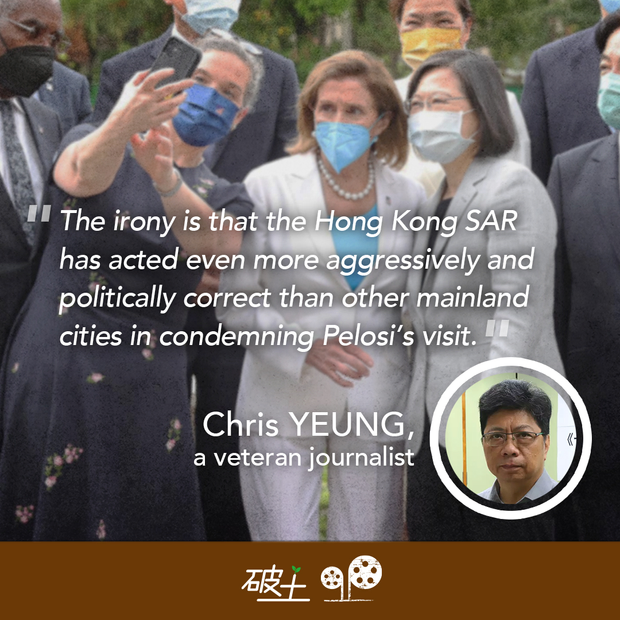HK joins war games firing salvos at Pelosi

Hong Kong Chief Executive John Lee and his team could not wait for the military drills of the People’s Liberation Army around Taiwan from Thursday to Sunday. The belated show of fury began one day after US House Speaker Nancy Pelosi left Taiwan on Wednesday afternoon.
Starting from the early hours of Wednesday, Lee and his ministers fired salvos at Pelosi shortly after she arrived in Taipei on board a US military aircraft from Malaysia. It is the first of its kind with the whole ruling team issued separate statements and posts on Facebook to mimic the stance of the central government on diplomatic warfare.
The strings of statements are short in substance, but long in rhetoric and their implications on the style and approach of the Lee team.
In view of the complexities and sensitivity of big-power and cross-Straits politics, it is not surprising that the Government has been shy from wading into those political tussles, not until the dropshell dropped by Pelosi.
Under the Basic Law, defence and foreign affairs fall under the jurisdictions of the central authorities. Relations with Taiwan are an issue with no less sensitivity. The post-1997 government has handled Taiwan-related matters with caution in accordance with the central government’s policies and guidelines.
When it comes to Taiwan, Hong Kong makes little difference with other provinces and municipalities. In short, it is a matter being handled by the central authorities.
In the case of Pelosi’s visit, no provincial and municipal authorities have issued any statement as of Wednesday.
In their statement, a Government spokesman lambasted Pelosi’s visit as a “gross interference in China’s internal affairs.” It added the SAR Government fully supports the Central Government in opposing the interference by external forces in the internal affairs of China. The Government, the spokesman said, will facilitate the implementation of countermeasures to be taken by China against the US.
Beijing has insisted the issues of Taiwan, Hong Kong are China’s internal affairs.
The government’s basic stance is hardly a surprise, but the blitz of attacks launched by the Lee team is eyebrow-raising and mind-boggling.
It is unclear whether the Chief Executive had acted on their own initiatives or was told by the central authorities to do so. Both scenarios look inconceivable.
It would have been an act of sheer naivety if Lee and his team felt there is no harm for them to simply echo what the central authorities have said in their statements. Similarly, it would have been a reckless political move if the central authorities saw no harm for the SAR government to join the diplomatic fray.
In either case, they raise serious questions about the ability of the SAR government to run an open, international financial hub with wisdom and skill in finding a right place in diplomatic war games.
In its pledge to facilitate the implementation of countermeasures to be taken by China against the US, the Government was virtually dipping into the political filthy waters.
Any acts by the Government to emulate the central authorities imposing bans on Taiwan imports and exports could damage the city’s reputation as a city with free trade. Importantly, it will send jitters to the business people for being a victim if countermeasures are enforced.
It remains to be seen whether the Government’s pledge on facilitating countermeasures is mere paying lip service, or is a serious move with an aim to show their political commitment to defending national interests and sovereignty.
Judging from the deeds and words of Lee and his team, it looks more likely that they have already switched to the mindset of a political ruling team with loyalty and dare-to-fight spirit acting in unison with the central authorities.
The irony is that the Hong Kong SAR has acted even more aggressively and politically correct than other mainland cities in condemning Pelosi’s visit.
Given the all-out blasts by the Lee team, cynics could be forgiven in casting doubts about how the “one country, two systems” policy is being played out, or whether it is no longer what it was.
To the Taiwan people, they couldn’t care less. The condemnation exercise of the Hong Kong government speaks volume about the experiment of “one country, two systems” in the city. It is a Hong Kong story that they don’t want to repeat on the island.
▌[At Large] About the Author
Chris Yeung is a veteran journalist, a founder and chief writer of the now-disbanded CitizenNews; he now runs a daily news commentary channel on Youtube. He had formerly worked with the South China Morning Post and the Hong Kong Economic Journal.